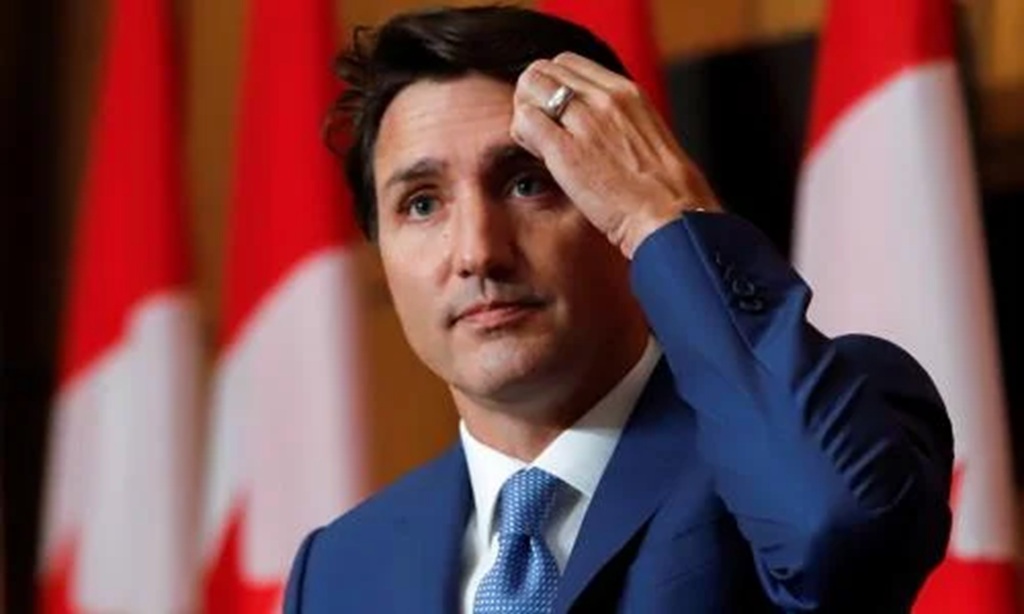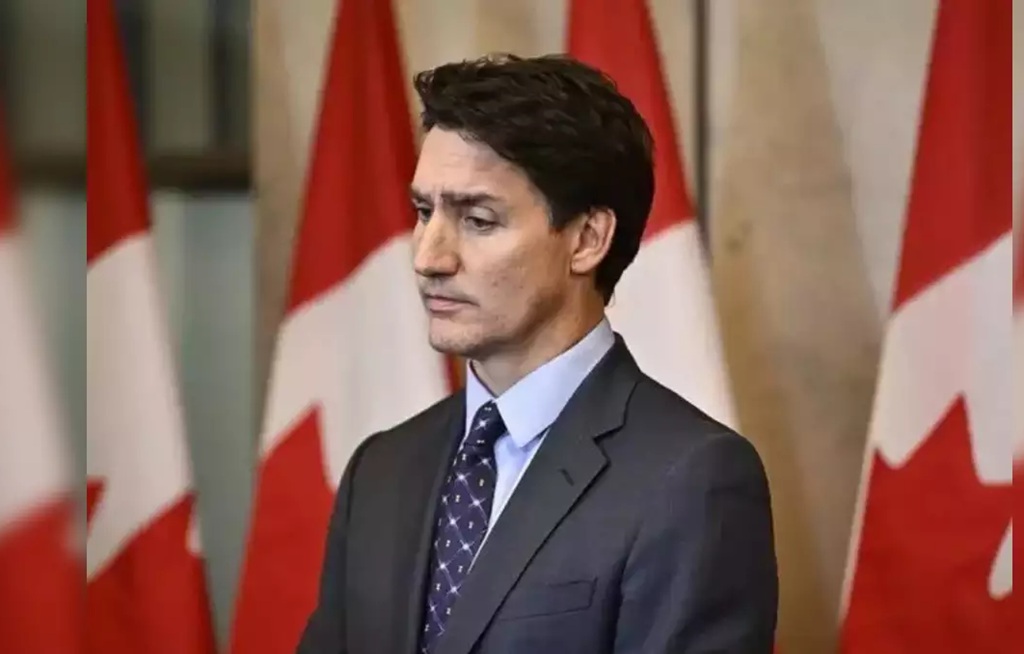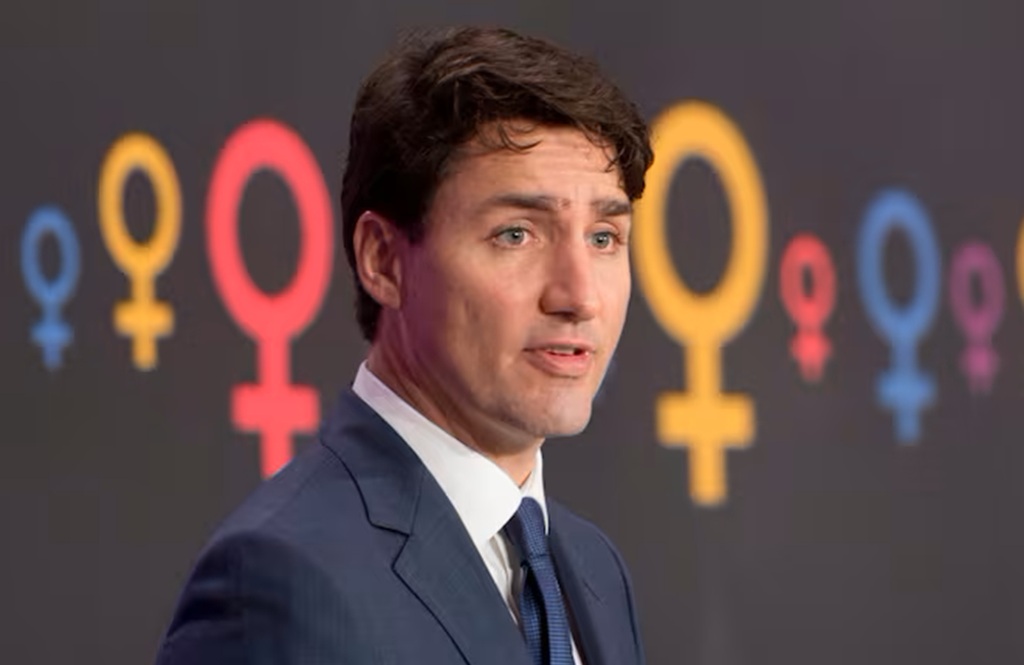Politics
Canada’s Minister of Finance Chrystia Freeland Resigns

Chrystia Freeland stepped down as finance minister on Monday after disagreeing with Justin Trudeau over US President-elect Donald Trump’s tariff threats and a budget deficit that could be $20 billion over the promised $40.1 billion cap.
Chrystia Freeland’s departure is the first open dissent against Prime Minister Justin Trudeau from a senior cabinet minister, which may jeopardize his grasp on power.
Trudeau is 20 points behind his strongest competitor, Conservative Pierre Poilievre. Since September, Poilievre has tried three times to destabilize the government and trigger a fast election.
First elected to parliament in 2013, Freeland joined Trudeau’s cabinet two years later, when the Liberals surged to power, holding important cabinet positions such as trade and foreign minister and overseeing free trade discussions with the EU and the United States.
In her resignation letter, Freeland stated that Trudeau offered to reassign her to another position, to which she responded, “I have concluded that the only honest and viable path is for me to resign from cabinet.”
Freeland Warns Over Tariffs
As finance minister, she emphasized taking Trump’s tariff threats “extremely seriously.” She warned that it might lead to a “tariff war” with the US and urged Ottawa to keep its “fiscal powder dry.”
“That means eschewing costly political gimmicks, which we can ill afford,” she said, appearing to criticize a recent sales tax holiday opponents said was expensive and geared at strengthening Trudeau’s sinking electoral fortunes.
Freeland’s rejection of Trudeau’s economic ideas is “a big problem,” indicating that his cabinet is not as united as many had assumed.
Freeland resigned the same day she was expected to update the nation’s finances amid predictions that the government would exceed Freeland’s $40.1 billion deficit projections in April.
Trudeau’s Housing Minister, Sean Fraser, who announced his resignation on Monday, hailed Freeland as “professional and supportive.”
“This government is in shambles,” replied Conservative deputy leader Andrew Scheer after hearing about Freeland’s departure. Even she has lost faith in Trudeau”, sheer said.
NDP Leader Jagmeet Singh says Prime Minister Justin Trudeau should resign but stopped short of calling for an election. He also did not specify whether he would withdraw his support for the minority government.
NDP Leader Jagmeet Singh has voted with the Liberals on three Conservative non-confidence motions this fall, keeping the government from toppling.
Meanwhile, the Ministry of Finance is still planning to unveil its long-awaited fall economic statement (FES) after weeks of speculation about a higher-than-projected deficit and the potential failure of other fiscal “anchors” Trudeau claimed her would keep his budget on track.
The Ministry said the news blackout on the Fall Economic Statement will be lifted at approximately 4 p.m. It is still unclear who will present the document in the House of Commons.
Related News:
Freeland Dodges Media After Omitting Capital Gains Tax Adjustment from 2024 Budget
Politics
Trudeau Accused of “Phony Feminism” After Freeland’s Departure

Prime Minister Justin Trudeau is facing a backlash for claiming to be a feminist after firing Chrystia Freeland as Finance Minister and replacing her with Dominic Leblanc on Tuesday.
Justin Trudeau has positioned himself as a feminist leader, a central element of his political identity. In 2015, Canada made history by appointing its first gender-equal cabinet, a significant step in the ongoing effort to champion women’s rights policies.
Trudeau aimed to solidify his reputation as a pioneer in the fight for gender equality. Recent accusations of “phoney feminism” have sparked a heated debate regarding the consistency between his statements and his actions.
Chrystia Freeland’s resignation from the cabinet has sparked criticism directed at Prime Minister Trudeau, raising questions about his approach to women in leadership roles.
Chrystia Freeland, previously regarded as one of Prime Minister Trudeau’s closest allies, has officially resigned from her position as Finance Minister. In her resignation letter, she notably omitted any reference to gender issues.
Freeland’s departure mirrors Trudeau’s removal of several high-profile women;
- Jody Wilson-Raybould, former Attorney General, was removed in 2019 after the SNC-Lavalin controversy.
- Jane Philpott, then President of the Treasury Board, was also ousted following her support for Wilson-Raybould.
- Celina Caesar-Chavannes, a Liberal MP, left politics after claiming Trudeau didn’t handle internal disagreements well.
These firings have fuelled debates about his handling of women in leadership positions and made a mockery of his claims of being a feminist.
Conservative Leader Pierre Poilievre criticized Trudeau for the optics of replacing Freeland with a male cabinet member, calling it evidence of Trudeau’s “fake feminism.”
“Just blame Chrystia Freeland and make her wear it all. Some feminist,” Poilievre said at a news conference on Tuesday.
The same week as Trudeau was insulting Americans for not electing a woman president, he was busy throwing his own woman deputy prime minister under the bus to replace her with a man, Poilievre commented.
Prominent Conservative MP Michelle Rempel Garner asked how any woman in that caucus could “defend that man instead of calling for an election now,” while Alberta Premier Danielle Smith said Trudeau needed to start proving himself if he was going to keep declaring himself “to be such a supporter of women.”
MP Melissa Lantsman referred to an “old boys’ club” being in charge.
“It’s time for credible leadership in the seriousness of this moment, not the fake feminism of this phoney prime minister,” said Lantsman, who represents the Conservatives in the Thornhill riding.
Former Liberal MP Celina Caesar-Chavannes said she believes there is a pattern of female cabinet ministers who were “thrown under the bus” after “challenging someone whose name is Trudeau.”
Trudeau Defended
However, while Freeland’s resignation has sparked accusations of sexism, political experts suggest that focusing solely on gender may oversimplify the issue.
Freeland, an accomplished politician and the country’s first female Finance Minister left primarily due to policy disagreements. Her decision was less about being a powerful woman and more about divergent views on leadership and economic strategy.
Political scientist Dr. Melanee Thomas remarked that qualified women in politics often face frustrations when their expertise is dismissed.
She cautioned against reducing complex political dynamics to gender alone. By framing Freeland’s resignation solely as evidence of sexism, the broader challenges faced by all leaders in Trudeau’s cabinets—men and women alike—are overlooked.
Trudeau has remained relatively quiet, stating that Freeland’s departure was not an “easy day” for him.
Unlike previous controversies, he has not publicly defended his feminist credentials since Freeland’s resignation, leaving a vacuum for critics to dominate the narrative.
Over the years, Trudeau has said that “adding women changes politics,” presenting himself as an ally for feminist causes. His silence now begs the question: does he believe his track record speaks for itself, or is he struggling to respond to the growing skepticism?
Politics
Liberal MPs Call on Trudeau to Resign

Prime Minister Justin Trudeau is facing extreme political pressure, with Liberal MPs publicly urging him to step down for the sake of the Liberal Party of Canada.
Yesterday, Trudeau faced a triple setback: the resignations of Finance Minister Chrystia Freeland and Housing Minister Sean Fraser and a crushing byelection loss in British Columbia.
Trudeau is facing an uphill battle to maintain his grip on leadership as dissatisfaction among Liberal MPs is mounting. The recent events have added fuel to the fire.
Freeland, formerly one of Trudeau’s most prominent cabinet members, resigned in protest after allegedly being informed she’d be shuffled out of her role as finance minister. Many MPs believe this was poorly handled and symbolic of deeper issues within Trudeau’s leadership.
Adding insult to injury, the Liberals lost a B.C. byelection by 50 percentage points to the Conservatives—a seat they had held in the last general election. This loss has amplified concerns that Trudeau can no longer resonate with voters.
For the Good of the Party
Some Liberal MPs said Tuesday that Prime Minister Justin Trudeau cannot continue as party leader and needs to resign for the party’s good.
Liberal MPs like Wayne Long and Ken Hardie are now outspoken critics, claiming that Trudeau’s leadership is a huge liability for the party. Long described the Prime Minister as “living in a false reality,” warning that staying the course could lead the Liberals to electoral disaster.
Ontario MP Francis Drouin, a longstanding defender of Trudeau, has joined the chorus of dissent. He doubted the party’s ability to move forward under Trudeau, saying, “I’ve been a great defender, but I just don’t see how we recover.”
Other MPs, including Alexandra Mendès and Sean Casey, have echoed similar sentiments. Mendès stated she was deeply affected by Freeland’s treatment, while Casey suggested that Trudeau no longer enjoys the confidence of the caucus.
The Liberal caucus appears more divided than ever, with roughly a third of MPs reportedly favouring Trudeau’s immediate resignation. According to Long, between 40 and 50 MPs actively push for his resignation, while around 50 remain loyal to him. The rest are seemingly undecided or staying silent.
Trudeau’s Unwillingness to relinquish power
This lack of unity is becoming a significant issue. MP Chad Collins admitted, “I can say we’re united.” He suggested a secret ballot within the caucus would reveal overwhelming opposition to Trudeau’s continued leadership.
At a Liberal caucus meeting today, Trudeau acknowledged the growing discontent; however, he hasn’t shown any signs of stepping down. He assured MPs he understood their concerns, but many doubted his willingness to relinquish power.
The Liberals are at a crossroads. Liberal MPs worry they could lose the next general election if Trudeau remains in office, with polls showing Trudeau’s public support hovering around 20 percent.
MPs have called for a change before it’s too late, calling Trudeau’s leadership a “drag” on the party’s prospects.
The internal division might deepen if Trudeau doesn’t resign. According to some political analysts, more backbenchers will switch sides against Trudeau, especially if they are left out of the next cabinet move.
One thing is certain: the Liberal Party must decide soon. The longer the ambiguity persists, the more difficult it will be to regain voters’ confidence. For now, Canadians are left wondering whether Trudeau’s tenure as prime minister is ending—or if he will beat the odds once more.
Related News:
Dominic LeBlanc Sworn in as Canada’s New Finance Minister
Politics
Justin Trudeau’s Fight for Gender Equity in Canada

Justin Trudeau made news in 2015 by introducing Canada’s first gender-balanced cabinet, a decision that established the tone for the government’s commitment to gender equity and representation.
Since his election in 2015, Prime Minister Justin Trudeau’s government has prioritized gender parity. From cabinet makeup to legislative efforts, the government has taken significant steps to reduce disparities and promote inclusion in Canada.
By assuring equal representation in top positions, the Trudeau government sends a strong message: varied perspectives improve governance.
While symbolic steps such as a balanced cabinet are vital, some believe that more than representation alone needs to address underlying issues. The Trudeau government has supported representation through measures to overcome these hurdles, leading us to the following issue.
Gender Equity in Pay
In 2021, Canada passed the Pay Equity Act, which requires federal workplaces to provide equal pay for equal work. This was a significant step towards narrowing the salary disparity between men and women.
The rule applies to firms with ten or more employees in federally regulated industries, promoting openness and fair compensation.
The government also developed the National Strategy to Prevent and Address Gender-Based Violence, prioritizing prevention, social services, and judicial reforms. Shelters, crisis centres, and advocacy groups have received extra funding to ensure survivors can access support.
Affordable childcare is crucial for allowing women to participate in the workforce. The Liberal government implemented a $10-per-day childcare program to alleviate the financial burden on families. This approach benefits parents, particularly mothers, who bear the burden of caring tasks.
One of the Trudeau administration’s most prominent innovations is using a “gender-based analysis plus” (GBA+) methodology for federal budgeting. This guarantees that government spending decisions consider the effects on different genders and other intersecting characteristics such as race, handicap, and income level.
Sexual and reproductive health projects
For example, the 2024 Autumn Economic Statement included continuous spending to protect women’s reproductive health and eliminate disparities in healthcare access. This approach prioritizes equity in resource allocation, recognizing that blanket policies frequently fail to adequately serve marginalized people.
In September 2024, Trudeau announced over $200 million in funding for worldwide sexual and reproductive health projects. These initiatives prioritize education, contraceptive access, and maternity healthcare.
Domestically, the government has boosted funding for abortion services, especially in impoverished areas. These initiatives demonstrate a commitment to empowering women and giving them authority over their healthcare decisions.
Despite these attempts, women in Canada continue to encounter challenges in the workplace. The gender pay gap is severe, particularly among racialized and Indigenous women. Critics believe that while regulations like the Pay Equity Act are a fine place to start, enforcement and oversight must improve.
Some campaigners have argued that the government’s approach to gender equity fails to address the unique issues that non-binary people confront, as well as those who face numerous types of discrimination. For example, racialized women and women with disabilities frequently suffer compounded injustices that broad measures can not fully address.
Advocating for Gender Equity
Efforts to promote gender equality have also encountered opposition. Some accuse the administration of focusing too much on identity politics, claiming that these programs take attention away from more serious issues.
However, supporters argue that equity is essential for a successful society and economy.
The Trudeau government continues to advocate for gender equality on several fronts. There is reason to be optimistic about future policy reforms and increased investments in healthcare and education.
Simultaneously, persistent advocacy will be required to guarantee that progress accomplished thus far does not stall.
Gender fairness isn’t just a moral obligation; it’s also a sound policy. The Trudeau government has worked to make Canada more equitable and inclusive by removing barriers and providing new possibilities.
While problems persist, the foundation has been created for future improvement. The challenge is how to capitalize on this momentum to achieve long-term change. Gender equity is a never-ending goal through policy, representation, or public dialogue.
It’s a difficult but important trip, and everyone’s opinion counts.
Related News:
Walmart Abandons DEI Ahead of Trump’s Inauguration
-
Politics3 weeks ago
Miller Expects 4.9 Million Foreigners to Leave Canada Voluntarily
-
News3 weeks ago
Nolinor Boeing 737 Crash Lands in Montreal
-
News2 weeks ago
“Shocking Video” Vancouver Police Shoot Armed Suspect 10 Times
-
Tech3 weeks ago
Increasing its Stake in OpenAI by $1.5 Billion is a Possibility for SoftBank.
-
News4 weeks ago
Facebook Securities Fraud Case Dropped
-
Health4 weeks ago
A Canadian Teenager’s Bird Flu Virus Has Mutations


























